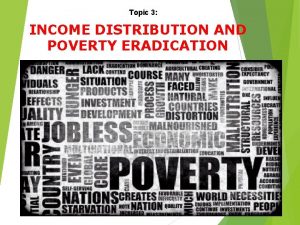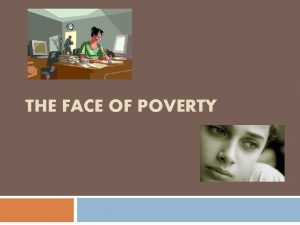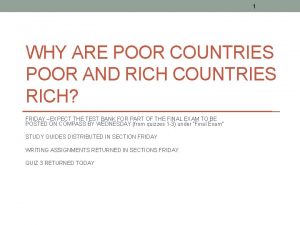Poverty Etymology The words poverty and poor came










![The lives of 1. 7 million children will be needlessly lost this year [2000] The lives of 1. 7 million children will be needlessly lost this year [2000]](https://slidetodoc.com/presentation_image_h2/5746a45a389a097dc96fa5a5b79858dc/image-11.jpg)

















- Slides: 28

Poverty

Etymology The words "poverty" and "poor" came from Latin pauper = "poor", which originally came from pau- and the root of pario, i. e. "giving birth to not much" and referred to unproductive farmland or livestock.

• • • Causes of Poverty Environment Geography Disease Historical factors Unemployment/Underemployment Lack of healthcare, education and infrastructure • Globalization

Half the world — nearly three billion people — live on less than two dollars a day.


Nearly a billion people entered the 21 st century unable to read a book or sign their names.

The wealthiest nation on Earth has the widest gap between rich and poor of any industrialized nation


The poorer the country, the more likely it is that debt repayments are being extracted directly from people who neither contracted the loans nor received any of the money

20% of the population in the developed nations, consume 86% of the world’s goods
![The lives of 1 7 million children will be needlessly lost this year 2000 The lives of 1. 7 million children will be needlessly lost this year [2000]](https://slidetodoc.com/presentation_image_h2/5746a45a389a097dc96fa5a5b79858dc/image-11.jpg)
The lives of 1. 7 million children will be needlessly lost this year [2000] because world governments have failed to reduce poverty levels”

The developing world now spends $13 on debt repayment for every $1 it receives in grants.

A few hundred millionaires now own as much wealth as the world’s poorest 2. 5 billion people.

Approximately 790 million people in the developing world are still chronically undernourished, almost two-thirds of whom reside in Asia and the Pacific. ”

According to UNICEF, 30, 000 children die each day due to poverty. And they “die quietly in some of the poorest villages on earth, far removed from the scrutiny and the conscience of the world. Being meek and weak in life makes these dying multitudes even more invisible in death. ”

Some 1. 1 billion people in developing countries have inadequate access to water, and 2. 6 billion lack basic sanitation.

Some 1. 8 million child deaths each year as a result of diarrhea

Number of children in the world : 2. 2 billion Number in poverty: 1 billion

2. 2 million children die each year because they are not immunized

• For economic growth and almost all of the other indicators, the last 20 years [of the current form of globalization, from 1980 - 2000] have shown a very clear decline in progress as compared with the previous two decades [1960 - 1980]. Among the findings: – – Growth: The fall in economic growth rates was most pronounced and across the board for all groups or countries. Life Expectancy: Progress in life expectancy was also reduced for 4 out of the 5 groups of countries, with the exception of the highest group (life expectancy 69 -76 years). Infant and Child Mortality: Progress in reducing infant mortality was also considerably slower during the period of globalization (1980 -1998) than over the previous two decades. Education and literacy: Progress in education also slowed during the period of globalization.

Global Priorities COSMETICS IN THE UNITED STATES 8 BILLION

ICE CREAM IN EUROPE 11 BILLION

PERFUMES IN EUROPE AND THE UNITED STATES 12 BILLION

PET FOODS IN EUROPE AND THE UNITED STATES 17 BILLION

CIGARETTES IN EUROPE 50 BILLION

NARCOTIC DRUGS IN THE WORLD 400 BILLION

MILITARY SPENDING IN THE WORLD 800 BILLION

Compare that to what was estimated as additional costs to achieve universal access to basic social services in all developing countries: BASIC EDUCATION FOR ALL: 6 BILLION WATER AND SANITATION FOR ALL: 9 BILLION REPRODUCTIVE HEALTH FOR ALL WOMEN: 12 BILLION BASIC HEALTH AND NUTRITION: 13 BILLION
 Absolute poverty and relative poverty
Absolute poverty and relative poverty Poverty poor health
Poverty poor health Instead of the cross the albatross alliteration
Instead of the cross the albatross alliteration Who coined the word photography?
Who coined the word photography? The value of cos600 cos300 - sin600 sin300 equals
The value of cos600 cos300 - sin600 sin300 equals Etymology and morphology
Etymology and morphology Hình ảnh bộ gõ cơ thể búng tay
Hình ảnh bộ gõ cơ thể búng tay Frameset trong html5
Frameset trong html5 Bổ thể
Bổ thể Tỉ lệ cơ thể trẻ em
Tỉ lệ cơ thể trẻ em Gấu đi như thế nào
Gấu đi như thế nào Tư thế worms-breton
Tư thế worms-breton Chúa sống lại
Chúa sống lại Các môn thể thao bắt đầu bằng tiếng chạy
Các môn thể thao bắt đầu bằng tiếng chạy Thế nào là hệ số cao nhất
Thế nào là hệ số cao nhất Các châu lục và đại dương trên thế giới
Các châu lục và đại dương trên thế giới Công thức tiính động năng
Công thức tiính động năng Trời xanh đây là của chúng ta thể thơ
Trời xanh đây là của chúng ta thể thơ Mật thư anh em như thể tay chân
Mật thư anh em như thể tay chân 101012 bằng
101012 bằng Phản ứng thế ankan
Phản ứng thế ankan Các châu lục và đại dương trên thế giới
Các châu lục và đại dương trên thế giới Thể thơ truyền thống
Thể thơ truyền thống Quá trình desamine hóa có thể tạo ra
Quá trình desamine hóa có thể tạo ra Một số thể thơ truyền thống
Một số thể thơ truyền thống Cái miệng nó xinh thế chỉ nói điều hay thôi
Cái miệng nó xinh thế chỉ nói điều hay thôi Vẽ hình chiếu vuông góc của vật thể sau
Vẽ hình chiếu vuông góc của vật thể sau Thế nào là sự mỏi cơ
Thế nào là sự mỏi cơ đặc điểm cơ thể của người tối cổ
đặc điểm cơ thể của người tối cổ



















































